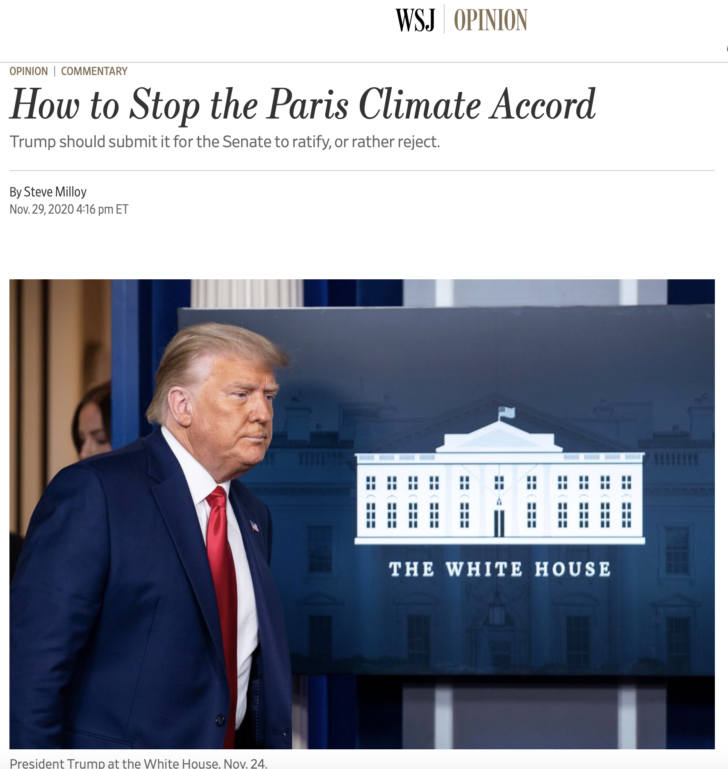My op-ed in today’s Wall Street Journal (Web | PDF).
Joe Biden has promised to rejoin the Paris Climate Accord on day one, but President Trump could stop it from having any binding legal power.
President Obama signed on to the international agreement by executive action in 2015, which meant Mr. Trump could withdraw from it the same way, as he did in 2017. As per the terms of the accord, that withdrawal became effective on Nov. 4, 2020. Mr. Obama’s pledge to reduce greenhouse-gas emissions at least 26% by 2025 wasn’t legally binding. Only Senate consent to its ratification could have made it so—and the upper chamber would have rejected the treaty handily if Mr. Obama had submitted it.
Yet if Mr. Biden brought the U.S. back into the accord, it’s possible it will take on the weight of law. Although there is nothing about the agreement’s terms or the manner in which the U.S. entered it that make it legally binding on the U.S., some green group may find a friendly federal court to produce that result.
Example: Mr. Trump rescinded Mr. Obama’s 2012 Deferred Action for Childhood Arrivals immigration program, yet it remains in place. Although DACA was both created and reversed by executive action, the Supreme Court blocked its rescission in June on grounds that the Trump administration’s decision was “arbitrary and capricious” under the Administrative Procedures Act. The court’s rationale was procedural; the justices didn’t deny that the president can reverse a predecessor’s executive action. But creative lawyers and judges can find ways of blocking a new president from changing policies, with Congress never having a say.
To prevent the Paris Climate Accord from taking on such undue power, Mr. Trump should submit it to the Senate, and Majority Leader Mitch McConnell should schedule a quick vote. It would certainly be rejected—ratification requires a two-thirds vote—and it is unlikely any court could subsequently resurrect a legislatively tossed treaty. Without the help of judges, Mr. Biden would need a winning ratification vote to make the accord binding, which he likely couldn’t get no matter how well Democrats do in Georgia’s January runoffs and the 2022 midterm elections.
Mr. McConnell could also call a ratification vote after Mr. Biden’s inauguration, even if Mr. Trump does nothing. This would similarly elevate the treaty’s status and make it difficult for Mr. Biden to bind his successors to his executive actions.
Mr. Milloy publishes JunkScience.com, served on the Trump Environmental Protection Agency transition team and is the author of “Scare Pollution: Why and How to Fix the EPA.”
